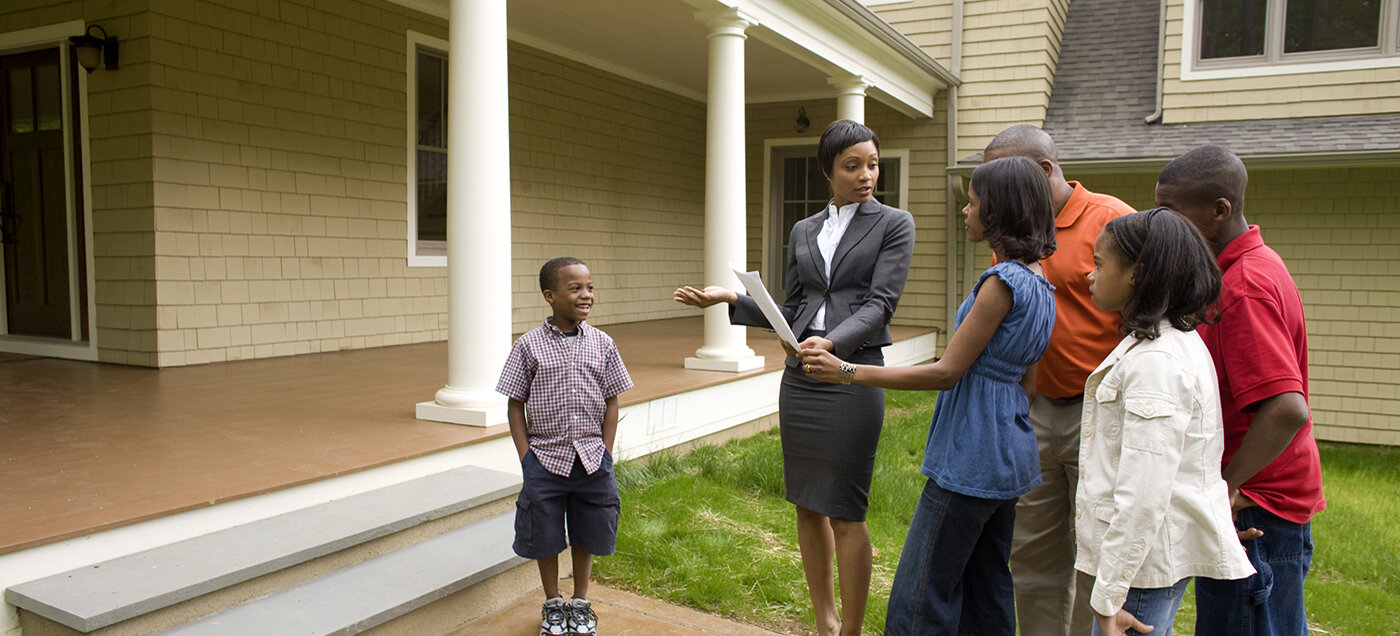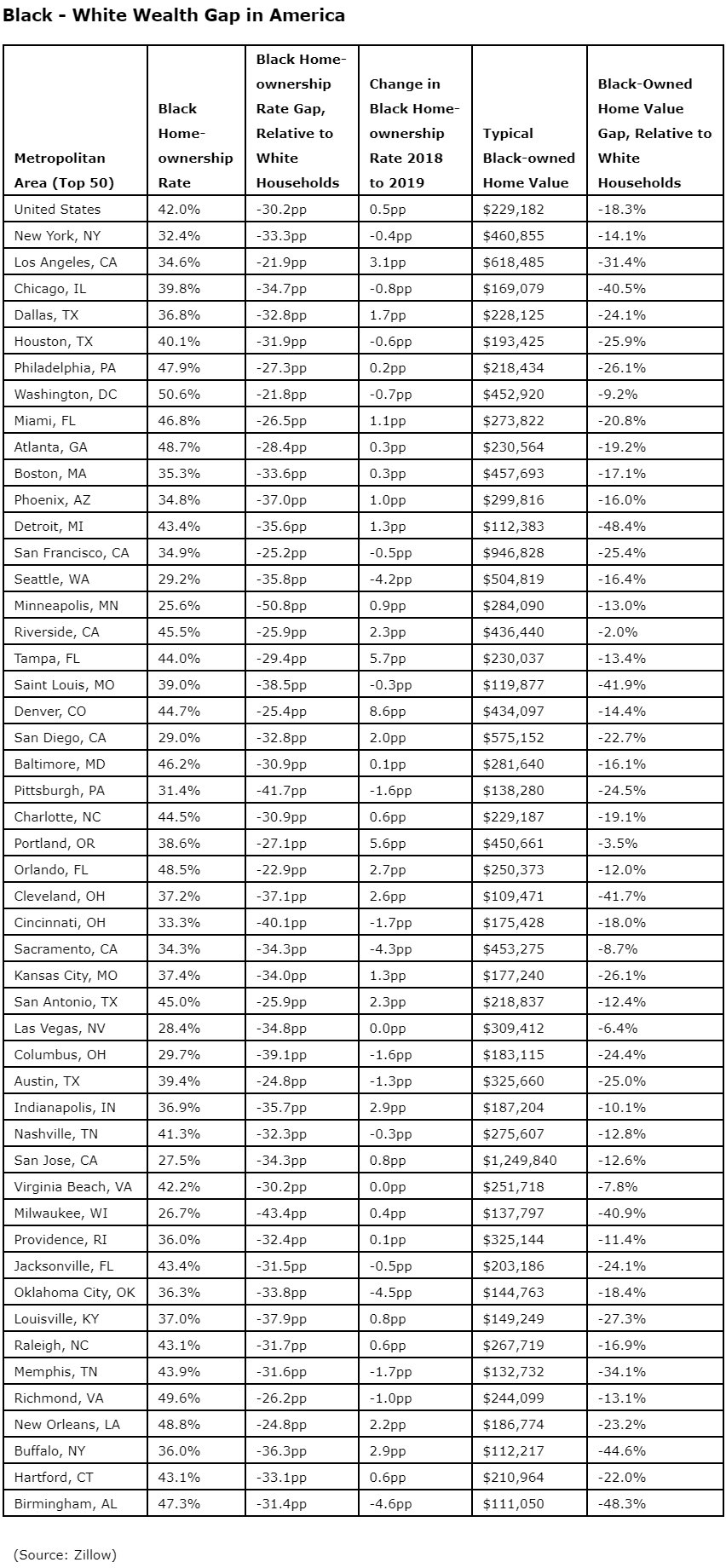Residential Real Estate News

Black Wealth May Grow by $500 Billion from U.S. Housing Gains in Coming Decade
Residential News » Atlanta Edition | By Michael Gerrity | April 28, 2021 8:24 AM ET
Based on new research by Zillow, incremental increases in U.S. homeownership rates and home values among Black households would help shrink the current $3 trillion racial wealth gap by hundreds of billions of dollars over the next decade.
Today's typical Black household has only about 23% of the wealth of a typical white household, down from 34.6% before the Great Recession. Housing factors -- including lower home values and rates of homeownership -- directly account for nearly 40% of that gap, with assets like investments in stocks and bonds and retirement accounts making up the rest.
"Housing will be a prominent factor determining the course of the racial wealth gap over the next decade," says Zillow economist Treh Manhertz. "The issues caused by historic discrimination won't be solved quickly, but addressing things like increasing access to credit, more-equitable lending standards and reducing exclusionary zoning could make buying more accessible and bring significant strides toward closing the wealth gap. In the most optimistic scenario, Black millennials could see housing equality in their retirement, and finally pass on some real wealth to the next generation."
About 42% of Black households own their home, compared to 72% of white households, and Black-owned homes are typically worth about 18% less than white-owned homes. Zillow estimates that if Black homeownership rates and home values rose to match those of their white counterparts, Black wealth would more than double (from $931 billion to $2.1 trillion).
Zillow analyzed home value growth and homeownership rate changes for Black households under five different scenarios through 2031. In the most optimistic, Black wealth would grow by more than half a trillion dollars -- from $931 billion to $1.46 trillion. Most likely, it would increase to about $1.18 trillion.
In that most likely scenario -- which projects Black home values growing 5% faster than home values generally and Black homeownership growing at 0.5 percentage points per year -- equality in housing wealth wouldn't come until 2183. If Black home values grow 15% faster than home values generally and Black homeownership grows at 1.5 percentage points per year -- the most optimistic scenario explored in the analysis -- the timeline for housing wealth equality is moved up to 2066.
Opposite of the disproportionate hit taken during the Great Recession, Black households saw modest progress in narrowing the wealth gap during and leading up to the pandemic, a small start toward reversing trends that helped widened the gap over the past decade. This was largely due to housing gains. For example, the Black homeownership rate grew about one percentage point between early 2019 and early 2020, while the white homeownership rate stayed flat.
Black-owned home values have also grown just over one percentage point faster than white-owned home values each year for the last three years. In February 2020, Black-owned home values were up 4.6% from a year earlier, while white home values were up 3.6%. In February 2021, Black home values were up 10.9% from the previous year, while white home values were up 9.7%. This faster appreciation among Black-owned homes narrowed the overall home value gap from 16.7% to 15.9%.
Further, the analysis shows that Black homeownership rates and home values contribute equally to the housing portion of the overall wealth gap. If the Black homeownership rate increased by five percentage points the wealth gap would decrease by $74 billion. If home values increased by five percentage points the reduction would be $31 billion. Combined, alleviating these two disparities could cut the wealth gap by about 40%, to $1.9 trillion.
Lenders deny mortgages for Black applicants at a rate 80% higher than that of white applicants. The relationship between housing factors and the racial wealth gap underscores the urgency of efforts like expanding access to credit and other initiatives that break down color barriers to homeownership.
"It's abundantly clear that this issue won't solve itself naturally or quickly. The problems run deep and perpetuate inequality," said Manhertz. "Intentional, targeted and dedicated policy is necessary to repair this broken system."
Sign Up Free | The WPJ Weekly Newsletter
Relevant real estate news.
Actionable market intelligence.
Right to your inbox every week.
Real Estate Listings Showcase
Related News Stories
Residential Real Estate Headlines
- U.S. New-Home Sales Surge in August as Mortgage Rates Ease
- Despite Increased Foreign Buyer Activity, Miami Residential Sales Dip 11 Percent in August
- California Home Sales Enjoy Modest Uptick as Mortgage Rates Ease
- U.S. Home-Flipping Profits Sink to Lowest Level Since 2008 Financial Crisis as Costs Climb
- Why the World's Rich Are Flocking to Europe in 2025
- Federal Reserve Delivers First Rate Cut of 2025 as Mortgage Relief Proves Limited
- Homebuilder Sentiment Holds Steady in U.S. as Rate-Cut Bets Lift Outlook
- U.S. Mortgage Rates Experience Sharpest Weekly Drop in Over a Year
- U.S. Foreclosures Rise for Sixth Straight Month as Affordability Pressures Mount
- Black U.S. Homeownership Rate Falls to Two-Year Low as Job Losses Mount
- Las Vegas Home Prices Flatten as Listings Surge, Sales Slow
- Cooling Miami Housing Market Sees 16 Percent Annual Sales Drop in July
- U.S. Mortgage Delinquencies Uptick in June Amid Regional Pressures
- California, Florida Top U.S. Housing Markets Most at Risk of Downturn
- 30-Year Mortgage Drops to 6.56 Percent in Late August, Lowest Since October 2024
- Investors Maintain Elevated Role in U.S. Housing Market Despite Slight Pullback
- Pending Home Sales Show Mixed Signals as U.S. Buyers Remain Cautious
- Canadian Home Sales Extend Recovery in July
- U.S. Home Sales Rise in July as Buyers Gain More Bargaining Power
- Zombie Foreclosures Edge Up Across U.S.
- 2.6 Million Homes at Wildfire Risk Across 14 Western States in 2025
- One in Five Americans Willing to Trade Personal Safety for Home Affordability
- U.S. Home Price Growth Slows as Affordability Pressures Mount in 2025
- U.S. Mortgage Rates Dip to Four Month Low in Early August
- U.S. Mortgage Applications Rise in Late July, Breaking Four-Week Slump
- Hong Kong's Housing Market Stuck in Stalemate as Bulls and Bears Face Off
- U.S. Condo Market Struggles in 2025
- U.S. Pending Home Sales Remain Sluggish in June
- Los Angeles Area Wildfires Destroyed Nearly $52 Billion in Homes Last January
- Greater Palm Beach Area Residential Sales Slip in June Amid Growing Inventory
- Economic Resilience Lifts U.S. Housing Outlook Going Forward
- New Home Sales Stagnate as Affordability Struggles Continue in America
- U.S. Housing Market Slips in June as Prices Hit New Highs
- Florida, California Continue to Reign Supreme as America's Ultraluxury Housing Markets
- Caribbean Housing Market Evolves into Global Second-Home Hotspot
- U.S. Home Sales See Highest June Cancellation Rate on Record
- Orlando Housing Market Cools in June as Listings Slide, Sales Slow
- Private Credit Surges in 2025 as Real Estate Developers Bypass Banks
- U.S. Condo Market Suffers Sharpest Price Drops in Over a Decade as Buyers Retreat
- Rising Taxes, Insurance Costs Undermine the Stability of U.S. Homeownership








